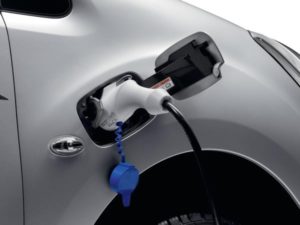The Government wants up to 40% of vans to be ultra low emission vehicles by 2030 as it outlines plans to drive take-up of cleaner vans in its long-awaited Road to Zero strategy.

Originally due to have been out in March, the newly published document builds on ambitions reiterated in the clean air strategy last summer that the sale of ‘conventional’ petrol and diesel car and vans would be banned from 2040.
The new document sets out an “ambition” that by 2030, at least 50% – and as many as 70% – of new car sales will be ultra low emission, alongside up to 40% of new vans. This follows ongoing calls, including from city leaders, for the 2040 target to be brought forwards.
The new document also outlines that to qualify as an ULEV, vehicles will need to be sub-50g/km from 2021 – down from the 75g/km that’s been used by OLEV since 2009.
The Government also sets out that it has no current plans to ban any particular technology – including hybrids – adding that the “Road to Zero Strategy is technology neutral and does not speculate on which technologies might help to deliver the Government’s 2040 mission.”
The document also talks about the means of driving ULEV take-up – including fleets and company car owners – and said: “This will include the creation of a taskforce with the motoring and insurance industry to promote the use of vehicle telematics technology.”
It also reiterates plans announced in the Spring Budget to consult on VED tax cuts for low-emission vans and to raise the GVW for electric vans to 4.25 tonnes while also outlining that the Government will collaborate with industry to develop an ultra low emission truck (ULET) standard to provide certainty on emission standards and encourage industry R&D in this area.
It also acknowledges the limited number of ULEVs in the commercial vehicle sector and says: “Ultra low emission vans provide substantial reductions in both NOX and greenhouse gas emissions but they currently make up only 0.3% of new sales and these are principally small electric vans. We will continue to incentivise their purchase and we want to see manufacturers bring forward more options.” However, it also acknowledged manufacturers’ work to improve diesels, which it said “will play a key role in improving air quality during the transition to zero emission vans”.
To further drive uptake of ULEVs, the document sets out how the Government will take “steps to enable [a] massive roll-out of infrastructure to support electric vehicle revolution” as it said the strategy “sets the stage for the biggest technology advancement to hit UK roads since the invention of the combustion engine”.
The document also brings vital new measures to ensure new homes and offices are equipped with electric car charge points along with new street light installations, while allocating larger grants to workplace charging and more funds to enhance the electric car charging infrastructure. This also includes confirmation that the Plug-In Car and Van Grants will continue in some form until at least 2020.
And Transport Secretary, Chris Grayling, said the Government would be monitoring the work on its ambitions: “We will review progress by 2025 and consider what interventions are required if not enough progress is being made.”
The document was welcomed by the BVRLA, but chief executive Gerry Keaney identified some potential issues: “It is critical that the right incentives are in place to support this strategy. Fleets invest billions of pounds on new cars, vans and trucks each year and a significant portion of this purchasing power stands ready to bring thousands more plug-in electric vehicles on to the UK’s roads. This can only happen if they are given the right supporting environment to deliver a managed transition away from petrol and diesel engines.”
He also said that there needs to be a greater alignment between the tax regime and efforts to improve air quality.
“Looking further forward, we are desperately in need of a zero-emission taxation roadmap that will give fleet operators the confidence to make long-term investments. We are starting to work with our members and other stakeholders to develop this roadmap,” Keaney added.

